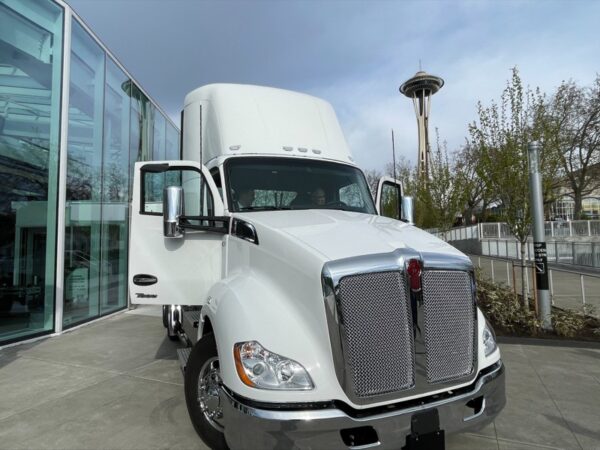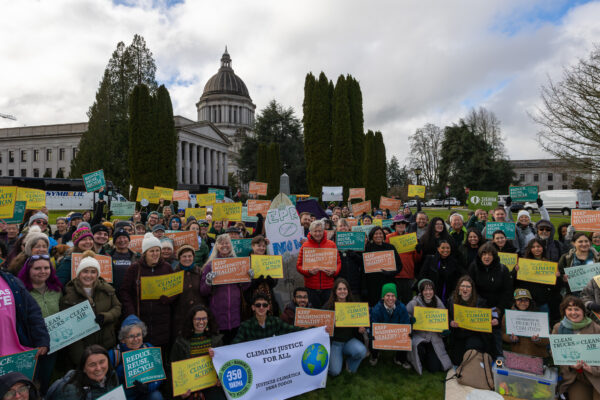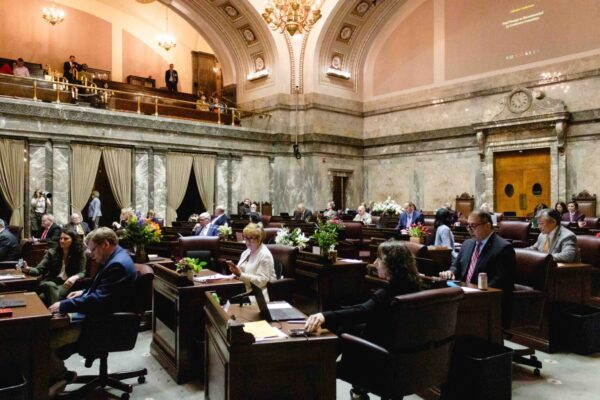The important steps forward in this bill include:
- Closing a tax loophole for oil moving by pipeline, which accounts for up to 40% of the oil moved in Washington state. This ensures all modes of transporting oil are taxed at the same rate to support the prevention and preparedness work of the state.
- Strengthens Puget Sound protections to address oils that submerge and sink and hires new inspectors to conduct specialized reviews of oil transfers and vessel inspections.
- Lays the groundwork to identify and accelerate additional safety measures to prevent oil spills such as developing an action plan to address the threat of barge traffic and conduct a transboundary summit on Salish Sea risks and protections.
“Washington must keep up with the level of risk we face from oil spills,” said Rebecca Ponzio, Climate and Fossil Fuel Program Director for Washington Environmental Council. “We applaud the legislature’s passage of this commonsense protection bill. This is a big step towards maintaining critical protections to safeguard Puget Sound and our region that relies on healthy thriving local waters.”
“Today the legislature showed they are ready to do what’s necessary to protect Washington from the threat of a catastrophic oil spill,” said Clifford Traisman, Lobbyist for Washington Conservation Voters and Washington Environmental Council. “This is a clear statement that protecting the health and safety of our state goes beyond party, it’s something every Washingtonian understands.”
“Changes in the way we move oil across Puget Sound, including the types of oil being transported, create new risk of oil spills,” said Bruce Wishart, lobbyist for Sierra Club and Puget Soundkeeper Alliance. “This bill will help ensure that we are prepared to meet that risk and prevent spills.”
“People of faith across Washington are glad to see the Legislature taking steps to improve oil transportation safety for the health of our communities and Puget Sound,” said LeeAnne Beres, Executive Director of Earth Ministry and Washington Interfaith Power & Light. “We care deeply about our neighbors and the sacredness of water is central in religious traditions, so we thank our legislators for passing the Oil Spill Prevention Act.”
“We are gratified to see the Legislature acknowledge the tremendous urgency needed to prevent and respond to potential oil spills in our state,” said Melissa Malott, Executive Director for Citizens for a Healthy Bay. “Considering the growing volume of tar sands traveling through our region, it is imperative for the health of our communities to have adequate funding for preventing spills in Commencement Bay and across Puget Sound.”
“Our communities and ecosystem in the Northwest corner of Washington face enormous risks from frequent shipments of oil on marine vessels, trains, and pipelines crossing rivers and farmland,” said Eddy Ury, Clean Energy Program Manager at RE Sources for Sustainable Communities. “We can afford to fund and improve spill prevention and response programs, but the costs of a single oil spill are unaffordable and unacceptable. We applaud the legislature for passing this bill today.”
“Oil transport, in any form, poses significant risks to public health and safety,” said Laura Skelton, Executive Director for Washington Physicians for Social Responsibility. “Crude oil exposure during spills and cleanup increases the risk of neurotoxicity, cancer, lung disease, and loss of cognitive function. As Washington sees oil transport evolve, this policy provides much-needed measures to better protect our communities from the growing threat of spills.”
“The passage of this bill is an essential step towards implementing necessary protections for Washington’s waters, especially in light of the numerous oil barge accidents that have occurred in the Salish Sea over the last few years,” said Marcie Keever, Oceans & Vessels Program Director for Friends of the Earth. “We want to thank Washington’s legislative leaders for advancing our State’s long tradition of working to protect our waters from oil spills.”
“This is a huge success for all of us that depend on the Salish Sea to be oil spill free,” said Stephanie Buffum Executive Director Friends of the San Juans.
“Shipping tar sands and other sinking oils through the Salish Sea is an unacceptable risk,” said Matt Krogh, Extreme Oil Campaign Director for Stand.earth. “Today’s vote sends an important message that Washington state takes the risk posed by tar sands oil in our waters seriously and we will do what it takes to protect the Salish Sea and the Puget Sound.”
This passage of this bill is part of a multi-year effort to update and strengthen the state’s tools for preventing and preparing for oil spills. In 2015, the legislature passed a landmark bill that increased public transparency of oil transportation (see here for interactive map and here for quarterly reports), extended the barrel tax to trains, and increased information around the level of insurance held by the railroads carrying crude oil.
Passage of SB 6269 marks another critical step forward to increase Washington state oil transportation safety. However, as Washington continues to see changes in oil transportation, the state Oil Spills program still needs long-term stabilized funding and updated spill prevention tools. The issue is expected to return to lawmakers and budget writers in future legislative sessions.



